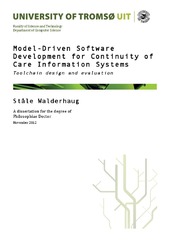Model-Driven Software Development for Continuity of Care Information Systems - Toolchain design and evaluation
Permanent lenke
https://hdl.handle.net/10037/5597Åpne
Thesis introduction and appendixes (PDF)
Walderhaug, S., Mikalsen, M., Hartvigsen, G., Stav, E., Aagedal, J.: 'Improving systems interoperability with model-driven software development for healthcare', Studies in Health Technology and Informatics (2007), 129(Pt 1), 122-126 (PDF)
Walderhaug, S., Stav, E., Mikalsen, M.: 'The MPOWER Tool Chain - Enabling Rapid Development of Standards-based and Interoperable HomeCare Applications', In: Sandnes, F.E. (ed.) Norsk Informatikk Konferanse (NIK) (2007), pp 103-107. (PDF)
Walderhaug, S., Mikalsen, M., Benc, I., Loniewski, G., Stav, E.: 'Factors affecting developers' use of MDSD in the Healthcare Domain: Evaluation from the MPOWER Project', In: Bailey, T. (ed.) From code-centric to modelcentric development, Workshop at European Conference on Model-Driven Architecture (2008), European Software Institute (PDF)
Walderhaug, S., Stav, E.: 'Experiences from model-driven development of homecare services: UML profiles and domain models', MOTHIS conference (2008) (PDF)
Walderhaug, S., Stav, E., Mikalsen, M.: 'Reusing models of actors and services in smart homecare to improve sustainability', Studies in Health Technology and Informatics (2008), vol. 136, pp.107-11 (PDF)
Walderhaug, S., Hartvigsen, G., Stav, E.: 'Model-driven traceability in healthcare information systems development¨', Studies in Health Technology and Informatics (2010), 160(Pt 1), 242-246. (PDF)
Dato
2013-03-13Type
Doctoral thesisDoktorgradsavhandling
Forfatter
Walderhaug, StåleSammendrag
This thesis summarizes six years of design, development and evaluation of a model- driven development toolchain and design of software services for continuity of care. The overall research method has been design science, with a strong focus on creating and evaluating the core artefact: the ModelHealth Toolchain. Three iterations with toolchain design and assessments were deemed necessary to be able to draw valid conclusions about tool design and development mechanisms.
Using models for designing software is best practice in software engineering, but few developers are utilizing the models for code generation with model-driven development tools. The key benefits claimed for model-driven development clearly fits the challenges of developing reusable software service in healthcare. Nevertheless, the scientific knowledge on how to utilize model-driven development for creating standardized and reusable software in healthcare is scarce. Which features of model-driven development are useful? Should tools be adapted to the healthcare domain? Which type of software services can be reused? These are questions being addressed in this thesis.
The overall contributions of this thesis are
• A set of reusable software service designs for continuity of care, provided as open source
• The ModelHealth toolchain supporting model-driven development of continuity of care web services, including reusable model elements and UML Profiles
• A set of recommendations on how to tailor a model-driven development toolchain for domain such as continuity of care.
A final important contribution is the comprehensive documentation of a complete design science research project, where all the three research cycles are involved. This increases the body of literature on design science research in software engineering.
Beskrivelse
Papers 5, 7, 9 and 10 of this thesis are not available in Munin:
5. haug, S., Stav, E., Johansen, U., Olsen, G.K.: 'Traceability in Modeldriven Software Development', In: Tiako, P.F. (ed.) Designing Software-Intensive Systems - Methods and Principles. pp. 133-160. IGI Global, Information Science Reference(2008), available at http://dx.doi.org/10.4018/978-1-59904-699-0.ch006
7. Holthe, T., Walderhaug, S.: 'Older people with and without dementia participating in the development of an individual plan with digital calendar and message board', Journal of Assistive Technologies (2010), vol. 4(2):15-25, available at http://dx.doi.org/10.5042/jat.2010.0278
9. Stav, E., Walderhaug, S., Mikalsen, M., Hanke, S., Benc, I.: 'Development and evaluation of SOA-based AAL services in real-life environments: A case study and lessons learned', International Journal of Medical Informatics (2011), vol. 82(11):269–293, available at http://dx.doi.org/10.1016/j.ijmedinf.2011.03.007
10. Walderhaug, S.: 'Evaluation of a Model-Driven Development Toolchain for Healthcare' (manuscript)
5. haug, S., Stav, E., Johansen, U., Olsen, G.K.: 'Traceability in Modeldriven Software Development', In: Tiako, P.F. (ed.) Designing Software-Intensive Systems - Methods and Principles. pp. 133-160. IGI Global, Information Science Reference(2008), available at http://dx.doi.org/10.4018/978-1-59904-699-0.ch006
7. Holthe, T., Walderhaug, S.: 'Older people with and without dementia participating in the development of an individual plan with digital calendar and message board', Journal of Assistive Technologies (2010), vol. 4(2):15-25, available at http://dx.doi.org/10.5042/jat.2010.0278
9. Stav, E., Walderhaug, S., Mikalsen, M., Hanke, S., Benc, I.: 'Development and evaluation of SOA-based AAL services in real-life environments: A case study and lessons learned', International Journal of Medical Informatics (2011), vol. 82(11):269–293, available at http://dx.doi.org/10.1016/j.ijmedinf.2011.03.007
10. Walderhaug, S.: 'Evaluation of a Model-Driven Development Toolchain for Healthcare' (manuscript)
Forlag
Universitetet i TromsøUniversity of Tromsø
Metadata
Vis full innførselSamlinger
Copyright 2013 The Author(s)
Følgende lisensfil er knyttet til denne innførselen:


 English
English norsk
norsk
